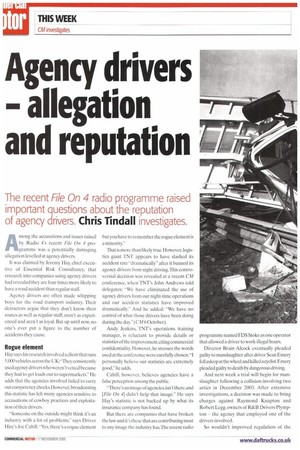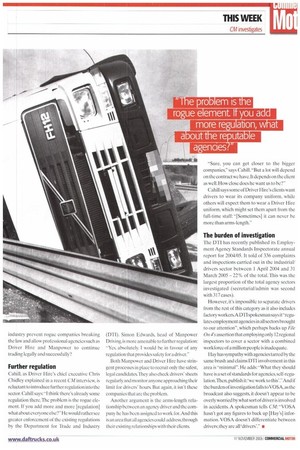Agency drivers allegation and reputation
Page 28

Page 29

If you've noticed an error in this article please click here to report it so we can fix it.
The recent File On 4 radio programme raised
important questions about the reputation of agency drivers. Chris Tindall investigates
Among the accusations and issues raised by Radio 4's recent File On 4 programme was a potentially damaging allegation levelled at agency drivers.
It was claimed by Jeremy Hay, chief executive of Essential Risk Consultancy, that research into companies using agency drivers had revealed they are four times more likely to have a road accident than regular staff.
Agency drivers are often made whipping boys for the road transport industry. Their detractors argue that they don't know their routes as well as regular staff, aren't as experienced and aren't as loyal. But up until now, no one's ever put a figure to the number of accidents they cause.
Rogue element
Hay says his research involved a client that runs 5,000vehicles across the UK:"They consistently used agency drivers who weren't vetted because they had to get loads out to supermarkets" He adds that the agencies involved failed to carry out competency checks However,broadcasting this statistic has left many agencies sensitive to accusations of cowboy practices and exploitation of their drivers "Someone on the outside might think it's an industry with a lot of problems," says Driver Hire's Joe Cahill. Yes, there's a rogue element but you have to remember the rogue elem en t is a minority."
That is more than likely true. However, logistics giant TNT appears to have slashed its accident rate "dramatically" after it banned its agency drivers from night driving. This controversial decision was revealed at a recent CM conference, when TNT's John Andrews told delegates: "We have eliminated the use of agency drivers from our night-time operations and our accident statistics have improved dramatically." And he added: "We have no control of what those drivers have been doing during the day." (CM6 October).
Andy Jenkins, TNT's operations training manager, is reluctant to provide details or statistics of the improvement,citing commercial confidentiality. However, he stresses the words used at the conference were carefully chosen."I personally believe our statistics are extremely good." he adds.
Cahill, however, believes agencies have a false perception among the public.
"There's an image of agencies, isn't there, and [File On 4] didn't help that image." He says Hay's statistic is not backed up by what its insurance company has found.
But there are companies that have broken the law and it's these that are contributing most to any image the industry has.The recent radio programme named FDS Stoke as one operator that allowed a driver to work illegal hours.
Director Brain Alcock eventually pleaded guilty to manslaughter after driver Sean Emery fell asleep at the wheel and killed a cyclist. Emery pleaded guilty to death by dangerous driving.
And next week a trial will begin for manslaughter following a collision involving two artics in December 2003. After extensive investigations, a decision was made to bring charges against Raymond Knapton and Robert Legg, owners of R&B Drivers Plympton — the agency that employed one of the drivers involved.
So wouldn't improved regulation of the industry prevent rogue companies breaking the law and allow professional agencies such as Driver Hire and Manpower to continue trading legally and successfully?
Further regulation
Cahill, as Driver Hire's chief executive Chris Chidley explained in a recent CM interview, is reluctant to introduce further regulation into the sector. Cahill says:" I think there's already some regulation there. The problem is the rogue element. If you add more and more [regulation] what about everyone else?" He would rather see greater enforcement of the existing regulations by the Department for Trade and Industry (DTI). Simon Edwards, head of Manpower Driving,is more amenable to further regulation: "Yes, absolutely. I would he in favour of any regulation that provides safety for a driver."
Both Manpower and Driver Hire have stringent processes in place to recruit only the safest, legal candidates.They also check drivers' sheets regularly and monitor anyone approaching their limit for drivers' hours. But again, it isn't these companies that are the problem.
Another argument is the arms-length relationship between an agency driver and the company he has been assigned to work for. And this is an area that all agencies could address, through their existing relationships with their clients. "Sure, you can get closer to the bigger companies," says Cahill. "But a lot will depend on the contract we have. It depends on the client as well. How close does he want us to be?'" Cahill says some of Driver Hire's clients want drivers to wear its company uniform, while others will expect them to wear a Driver Hire uniform, which might set them apart from the full-time staff: "[Sometimes] it can never be more than arms-length."
The burden of investigation
The DTI has recently published its Employment Agency Standards Inspectorate annual report for 2004/05. It told of 336 complaints and inspections carried out in the industrial/ drivers sector between 1 April 2004 and 31 March 2005 — 22% of the total. This was the largest proportion of the total agency sectors investigated (secretarial/admit) was second with 317 cases).
However, it's impossible to separate drivers from the rest of this category as it also includes factory workers.A DTI spokesman says it "regulates employment agencies in all sectors brought to our attention", which perhaps backs up File On 4's assertion that employing only 12 regional inspectors to cover a sector with a combined workforce of a million people is inadequate.
Hay has sympathy with agencies tarred by the same brush and claims DTI involvement in this area is "minimal". He adds: "What they should have is a set of standards for agencies, self-regulation.Then, publish it: we work to this'.And if the burden of investigation falls to VOSA, as the broadcast also suggests, it doesn't appear to he overly worried by what sort of driver is involved in accidents. A spokesman tells CM: "VOSA hasn't got any figures to back up [Hay's] information. VOSA doesn't differentiate between drivers; they are all drivers'." •






































































































































































































